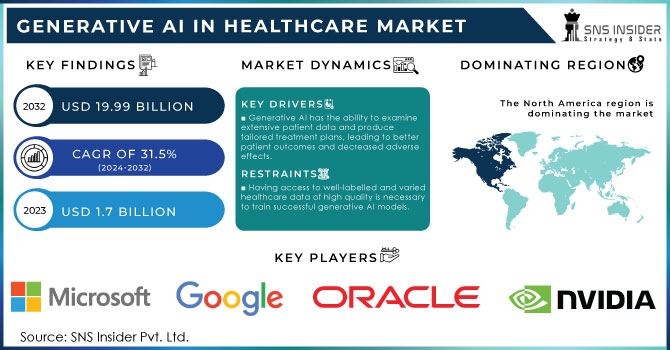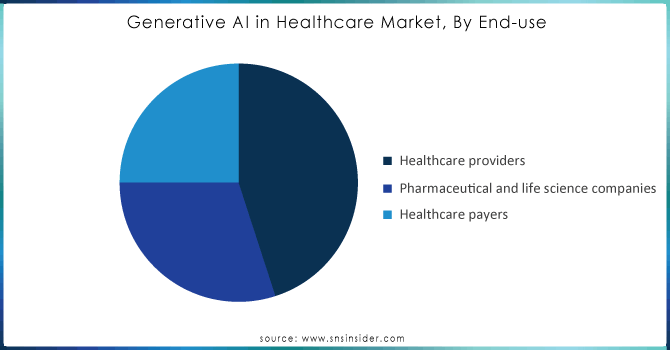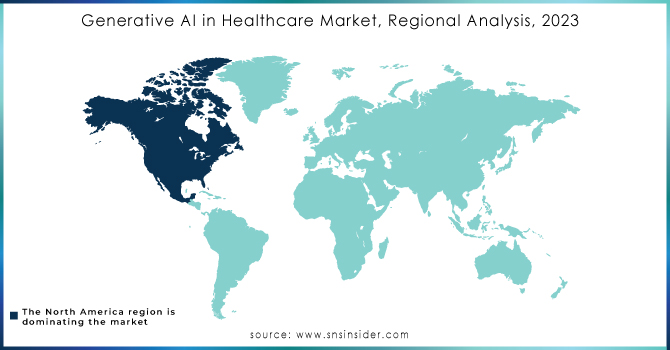Generative AI in Healthcare Market Scope:

Get More Information on Generative AI in Healthcare Market - Request Sample Report
The Generative AI in Healthcare Market size was valued at US$ 1.7 Bn in 2023 and is estimated to US$ 19.99 Bn by 2032 with a growing CAGR of 31.5% Over the Forecast Period of 2024-2032.
Several key factors are driving the demand for Generative AI in healthcare market. The technology's capability to improve diagnostic accuracy and efficiency is a key factor. Generative AI models have the ability to evaluate large quantities of patient data, such as medical images, electronic health records, and genetic information, in order to offer accurate diagnoses and customized treatment strategies. This ability is especially useful in complicated situations where traditional diagnostic techniques may not be sufficient. Moreover, the incorporation of Generative AI in drug discovery and development is hastening research procedures. It allows for quickly identifying potential drugs, refining clinical trial plans, and forecasting drug reactions, thereby cutting down on expenses and time needed to launch new treatments.
Another important factor is the increasing demand for telehealth services and remote patient monitoring. Generative AI tools support remote consultations and live tracking, enabling healthcare providers to provide ongoing care, particularly in areas with limited access to services. Furthermore, the growing focus on value-based care models is leading to the implementation of AI-driven technologies that enhance patient results and reduce expenses. Healthcare professionals are increasingly using generative AI to automate administrative tasks, streamline workflows, and decrease burnout in clinicians, ultimately improving operational efficiency. With an aging population, chronic diseases, and increased demand post-pandemic, healthcare systems worldwide are struggling, but generative AI provides a scalable solution to tackle these issues successfully.
Key Metrics Explaining the Demand Landscape for Generative AI in Healthcare Market:
The National Institutes of Health (NIH) reports that about 37% of clinical trials are currently using AI-based methods to improve patient recruitment and study designs. Moreover, a recent report by the Centers for Medicare & Medicaid Services (CMS) shows that AI algorithms are being used to streamline 24% of Medicare claims processing, leading to a significant decrease in administrative expenses.
The U.S. Department of Health and Human Services (HHS) reports that approximately 52% of public health surveillance systems are incorporating artificial intelligence (AI) technologies to enhance data gathering and real-time analysis, thereby reducing response times to public health crises by up to 45%. Furthermore, data from a study by the FDA reveals that 43% of recent drug development initiatives utilized artificial intelligence (AI) technology, leading to a notable 30% decrease in time-to-market.
Generative AI in Healthcare Market Dynamics:
Drivers:
-
Generative AI has the ability to examine extensive patient data and produce tailored treatment plans, leading to better patient outcomes and decreased adverse effects.
-
Generative AI has the ability to improve medical images, simplifying the process for healthcare providers to identify irregularities and diagnose illnesses.
-
Generative AI can detect and prevent security breaches by identifying abnormal patterns in data.
Generative AI is revolutionizing the healthcare industry by improving its security systems with the ability to pinpoint abnormal patterns in data, playing a vital role in the detection and prevention of security breaches. Using complex machine learning algorithms, generative AI can detect irregularities in large datasets that could signal unauthorized entry or potential dangers. Studies demonstrate that generative AI models can decrease false-positive alerts by more than 60%, enabling healthcare providers to concentrate on real threats. Hospitals and healthcare institutions that utilize generative AI technology have experienced a 45% enhancement in their ability to detect threats promptly, which has led to a significant decrease in the timeframe for potential vulnerabilities. During a recent trial, a healthcare facility's AI systems identified a phishing attack that went unnoticed, stopping a possible security breach that could have compromised patient information.
Furthermore, these AI models have the ability to constantly acquire new knowledge and adjust to emerging cyber risks, ultimately enhancing the overall strength of healthcare organizations. The capacity of generative AI to capture and comprehend intricate data patterns leads to improved forecasts of potential security incidents, decreasing the chances of data breaches by almost 30%. With the healthcare sector's data expanding, utilizing generative AI to detect anomalies provides a strong defense against cyber threats, safeguarding patient privacy and meeting regulatory requirements.
Restrains:
-
Having access to well-labelled and varied healthcare data of high quality is necessary to train successful generative AI models. Yet, the availability of data can be restricted by data fragmentation, privacy regulations, and ethical concerns.
Having access to well-structured and varied healthcare data with accurate labels is crucial for developing successful generative AI models. Within the healthcare industry, generative AI models utilize numerous data sources to imitate intricate situations, create diagnostic resources, and improve customized medicine. Nevertheless, the issue of data fragmentation is a major obstacle; healthcare information is frequently stored in separate systems, organizations, and regions, which complicates the process of collecting and merging complete datasets. Privacy regulations, like HIPAA in the US and GDPR in Europe, make data access more complicated. These rules impose stringent rules on sharing and utilizing data that are essential for maintaining patient privacy but may restrict the amount of data accessible for training AI models. Ethical considerations, such as ownership and consent of data, also influence the limitation of data access. Around 65% of healthcare institutions have difficulty finding a balance between data sharing and privacy issues, affecting their capability to effectively utilize generative AI.
Generative AI in Healthcare Market Segmentation Analysis:
By Application
Personalized treatment plans, accounting for roughly 25% of the market, use AI to customize interventions using patient-specific information, improving treatment accuracy. Virtual patient support comes next, holding a 20% portion, by simplifying patient engagements and administrative duties using AI-powered chatbots and virtual health aides. Utilizing AI for patient monitoring and predictive analytics, which make up approximately 22% of the market share, involves tracking real-time health data and predicting potential problems to enhance proactive healthcare.
Generative AI improves imaging techniques and diagnostic accuracy in medical image analysis and diagnostics, representing 18% of the market share by interpreting complex medical data. In conclusion, drug discovery and development account for 15% of the share, speeding up the process of finding new compounds and treatment approaches using AI-driven simulations and data analysis. Together, these apps illustrate the significant influence of generative AI in healthcare, enhancing effectiveness, accuracy, and creativity within the industry. The inclusion of AI in these various fields offers improved patient results and represents a significant move towards data-based healthcare solutions.
By End-Use
Healthcare providers, who hold about 40% of the market share, are using AI to improve clinical decision-making, simplify processes, and provide individualized patient care. AI technology is utilized in this industry to enhance the precision of diagnoses, streamline office duties, and improve the effectiveness of treatment strategies. Pharmaceutical and life science companies are using generative AI to transform drug discovery and development processes, holding a 35% stake in this advancement. These companies can speed up the discovery of new drug options and improve clinical trials by using AI simulations and predictive analytics. Healthcare insurers, with a 25% stake, are increasingly utilizing AI to improve claims processing, identify fraud, and better manage risk. AI tools in this sector aid in analysing data for managing costs and simplify the reimbursement processes with increased accuracy.

Need any customization research on Generative AI in Healthcare Market - Enquiry Now
Generative AI in Healthcare Market Regional Analysis:
In North America, the rapid growth of generative AI in healthcare is being driven by advanced technological infrastructure, significant investment, and a strong research environment. The forefront of this transformation in healthcare is driven by the United States and Canada's notable contributions to the development and utilization of AI technologies.
The healthcare market in the U.S. is a significant contributor to the development of generative AI, with a considerable portion of the market in the region. High levels of investment from private and public sectors, a favourable regulatory environment, and a high concentration of leading technology firms and research institutions are key factors driving this growth. Generative AI is widely used in the U.S. for personalized treatment plans, customizing medical interventions using detailed patient information. Technology is also revolutionizing the drug discovery and development procedures, resulting in a substantial decrease in time and expenses for introducing new drugs to the market. In addition, AI-powered virtual patient support and cutting-edge medical imaging are improving clinical effectiveness and diagnostic precision.
In general, North America's significant focus on research and development, along with ample financial support and a helpful regulatory environment, places the region at the forefront of incorporating generative AI into healthcare.

Key Players:
The Major players are Epic Systems Corporation, DiagnaMed Holdings Corp., Syntegra Medical Mind, IBM Watson Health Corporation, Google LLC, Oracle Corporation, Microsoft Corporation, Nvidia Corporation, Insilico Medicine, Abridge AI Inc., ELEKS, Persistent Systems and other players.
Recent Developments:
Epic Systems revealed a partnership with multiple large healthcare organizations to research how generative AI can enhance patient care. This study will concentrate on creating artificial intelligence models that can forecast patient results and help with clinical decision-making.
DiagnaMed Holdings Corp. has unveiled new generative AI capabilities in its diagnostic instruments focused on spotting neurodegenerative disorders at an early stage. The AI tools utilize sophisticated algorithms to examine intricate datasets like medical imaging and genetic information, leading to more precise diagnoses.
| Report Attributes | Details |
|---|---|
| Market Size in 2023 | USD 1.7 billion |
| Market Size by 2032 | USD 19.99 Billion |
| CAGR | CAGR of 31.5% From 2024 to 2032 |
| Base Year | 2023 |
| Forecast Period | 2024-2032 |
| Historical Data | 2020-2022 |
| Report Scope & Coverage | Market Size, Segments Analysis, Competitive Landscape, Regional Analysis, DROC & SWOT Analysis, Forecast Outlook |
| Key Segments | • By Application: (Personalized treatment plans, Virtual patient assistance, Patient monitoring and predictive analytics, Medical image analysis and diagnostics, Drug discovery and development, Other applications) • By End-use: (Healthcare providers, Pharmaceutical and life science companies, Healthcare payers) |
| Regional Analysis/Coverage | North America (US, Canada, Mexico), Europe (Eastern Europe [Poland, Romania, Hungary, Turkey, Rest of Eastern Europe] Western Europe[ Germany, France, UK, Italy, Spain, Netherlands, Switzerland, Austria, Rest of Western Europe]), Asia Pacific (China, India, Japan, South Korea, Vietnam, Singapore, Australia, Rest of Asia Pacific), Middle East & Africa (Middle East [UAE, Egypt, Saudi Arabia, Qatar, Rest of Middle East], Africa [Nigeria, South Africa, Rest of Africa], Latin America (Brazil, Argentina, Colombia, Rest of Latin America) |
| Company Profiles | Epic Systems Corporation, DiagnaMed Holdings Corp., Syntegra Medical Mind, IBM Watson Health Corporation, Google LLC, Oracle Corporation, Microsoft Corporation, Nvidia Corporation, Insilico Medicine, Abridge AI Inc., ELEKS, Persistent Systems |
| Key Drivers |
|
| RESTRAINTS |
|

